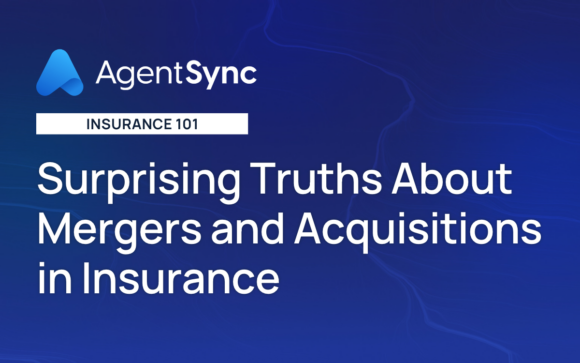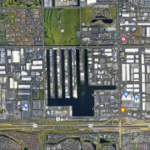This post is part of a series sponsored by AgentSync.

Mergers and acquisitions (M&A) are always a hot topic in insurance. From small agencies hoping to get acquired, large agencies hoping to get larger, or carriers looking to expand into new geographies or lines of business, there are a multitude of reasons companies consider mergers and acquisitions.
Since it’s such a common occurrence within the insurance industry, it’s no surprise that we’ve written about insurance mergers and acquisitions before. Interested in reading about why you should prioritize compliance in the business acquisition process? Done. Or wondering how you can avoid getting stuck with a lemon in an insurance acquisition? Done. How about an argument for why your tech stack matters before you even consider selling your insurance agency? Done!
But if you’re just looking for some basics – namely what is all this talk of M&A in the insurance industry about anyway – then you’ve come to the right place. In this blog we’ll cover the foundations like:
- What are mergers and acquisitions?
- How are mergers and acquisitions different from one another?
- Why are there so many mergers and acquisitions in insurance?
- Why do some insurance agencies acquire others?
- Why would you want your insurance agency to be acquired?
Before you read on, remember that we’re experts in producer license compliance management but we’re not your attorney or accountant. Before considering any insurance M&A activity for yourself, make sure you get expert advice from a trusted professional. For simplifying and automating your agency’s, carrier’s, or MGA’s compliance, see how AgentSync can help.
What does M&A mean in insurance?
The term M&A stands for mergers and acquisitions: the process by which multiple separate business entities become one. The phrase mergers and acquisitions can encompass a few different specific actions, each with different meanings and implications.
What is an insurance merger?
An insurance merger is when two separate companies form into one new company. For example, insurance carrier A and insurance carrier B decide they’d be in a better position together forming a new company: insurance carrier C.
What is an insurance acquisition?
An insurance acquisition is when one company acquires one or more other companies, thus bringing the acquired company under the umbrella of the acquiring company. The acquiring company, also called a parent company, doesn’t have to buy 100 percent of the company it wants to acquire. Generally, a company only needs to acquire more than 50 percent of another business to gain control.
How do mergers and acquisitions differ?
Quite simply, a merger usually refers to a “merger of equals” in which two companies mutually agree that it’s a smart business move to combine into one, newly formed company. An acquisition usually refers to a larger company purchasing all or part of a smaller company and becoming its new owner or parent company. Acquisitions can be voluntary or involuntary (sometimes known as a takeover or hostile takeover if the company being acquired isn’t mutually willing).
How common is M&A within insurance?
Mergers and acquisitions happen frequently within the insurance industry, encompassing insurance agencies, carriers, MGAs/MGUs, and insurance technology companies (insurtechs).
Over the last 20 years, insurance M&A deal values (how much each deal is worth) and deal volume (the number of deals conducted) have grown and remained high: anywhere from just under $40 billion across about 80 deals in 2003 to a record high of $57.5 billion across 869 deals in 2021. We should note that the exact number of deals and deal volume vary by sources but everyone agrees 2021 was a record year.
As the economy slowed in 2022, insurance industry mergers and acquisitions also cooled off. However, the industry “remained resilient” compared to M&A activity in other sectors of the economy – with agency and brokerage activity fueling insurance M&A at a far greater rate than insurance carriers.
Why do insurance carriers participate in M&A activity?
The biggest reason an insurance carrier will undergo mergers and acquisitions is to increase market share. They can accomplish this by merging with or acquiring an insurance carrier with a footprint in a whole new geographic region, new lines of business, or both. Sometimes insurance carriers will look to acquire others in an attempt to swallow up a company they see as valuable competition, which they’d rather have under their own roof than to compete against.
Insurance companies also see opportunities to reduce operating costs and overhead through M&A.
Why do insurance agencies participate in M&A activity?
In many cases, insurance agency owners see acquisition as the best exit strategy when they’re ready to retire. If an insurance agent has built a successful agency with a large and valuable book of business over the course of their career, selling the agency to a larger agency can be an attractive proposition. From the other side, larger agencies often want to expand their reach into new states and new lines of business, and the easiest way to do this is often to acquire an existing insurance agency that brings the desired qualities into the mix.
Why are mergers and acquisitions attractive compared to organic growth?
Organic growth may be the gold standard of a healthy business but mergers and acquisitions can help a company grow and hit the ground running quickly without having to staff up, train, or implement new technology. In a best case scenario, the acquiring company can start to see a nearly-immediate return on their investment with an already profitable company now under its umbrella.
What are some down sides to insurance mergers and acquisitions?
Sometimes M&A creates redundancies, both in people and systems. Spending time and money to sort out how the newly-created business entity will function when combining two previously independent companies, or how one company will absorb the operations of another, can be a downside of mergers and acquisitions.
Having the right insurance technology in place can lead to more successful mergers and acquisitions
This might not seem obvious but when undergoing a merger or acquisition, insurtech matters. For companies looking to be acquired, already using modern insurance infrastructure means potential buyers have a clear view of what they’ll be getting from operational, financial, and compliance perspectives. With AgentSync, for example, an insurance agency looking to be acquired can provide potential buyers with a full, real-time, accurate view of the compliance status of every producer working under that agency.
For companies looking to buy or merge, having the right tech stack will mean spending much less time moving data over by hand. Equipped with the right systems in place already means integrations and automation can help take the load off human employees who’d rather be doing more important work throughout the merger and acquisition process.
Whether you’re considering M&A at your organization or not, check out AgentSync’s suite of solutions to modernize your insurance business.
Topics Mergers & Acquisitions
Was this article valuable?
Here are more articles you may enjoy.



 Divers Find 32 Cars Submerged in Lake Near Miami
Divers Find 32 Cars Submerged in Lake Near Miami  Finance Firms’ Return-to-Office Crackdown Could Backfire: Deloitte
Finance Firms’ Return-to-Office Crackdown Could Backfire: Deloitte  Could Georgia Be Next With Major Tort Reform? Kemp Calls for Limits
Could Georgia Be Next With Major Tort Reform? Kemp Calls for Limits  Massive Citizens Takeout Plan Seen as Sign That Things Are Looking Up in Florida Market
Massive Citizens Takeout Plan Seen as Sign That Things Are Looking Up in Florida Market 


